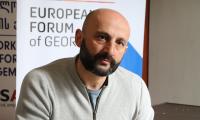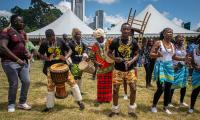Levan Tsutskiridze giver en status på demokratiet i Georgien
Til trods for at Georgien siden sin uafhængighed har bevæget sig i en demokratisk retning, har regeringen vendt sig mod autokratiet og er blevet mere og mere pro-russisk. DIPD har talt med Levan Tsutskiridze, direktør for the Eastern European Centre for Multiparty Democracy (EECMD) om udsigterne for demokratiet i Georgien.

Levan Tsutskiridze
Levan Tsutskiridze is Executive Director of the Eastern European Centre for Multiparty Democracy (EECMD). EECMD has partnered with the Danish Social Liberal Party through DIPD since 2020 to strengthen the internal organisation of five parties in Georgia.
He provides his analysis on the democratic situation in Georgian.
Increasing authoritarianism from the government
The Georgian government had bet on a quick Russian victory in Ukraine when the war broke out, according to Tsutskiridze.
As a result, an alliance with Russia was seen as beneficial. “The government is actively fearmongering the Georgian populace, spreading misinformation about the West’s desire to drag Georgia into a war with Russia.” Tsutskiridze explains that this is done to scare Georgians into compliance.
The EECMD anticipates the introduction of new legislation that will increase autocratisation. The current government, which has previously been inspired by autocratic policies enacted in Russia such as the controversial ‘Foreign Agents’ law, will almost certainly do so again.
Suppressive legislation will severely limit free speech by effectively prohibiting criticism of the government through anti-defamation laws and conservative anti-blasphemy laws, both of which can be used to suppress civil society movements and organisations.
Opposition politicians and democracy activists have been harassed by the government. Tsutskiridze exemplifies this authoritarian tendency by describing how an EECMD democracy school graduate was arrested and detained for no reason for 48 hours earlier this year.
The upcoming election
Georgia will hold its next parliamentary elections on October 2024. Much is at stake as the country is at a crossroads between democracy and authoritarianism.
According to Levan Tsutskiridze, the question of EU candidate ascendancy will be a central issue in the election. The EU has presented a 12-step plan outlining the requirements that Georgia must meet in order to be granted candidate status. The Georgian government claims to meet all these requirements, but Tsutskiridze claims this is untrue because many of the requirements refer to democracy.
Tsutskiridze predicts that the current government will abandon EU membership as a goal if they are not allowed to further the candidate process and continue their increasing authoritarianism. “It will happen under the guise of being an ‘independent democracy, which will not be stronghanded by foreign governments,” Tsutskiridze says, a notion that is already being planted in state propaganda.
The 2024 election will be the most important since Georgia's independence. Previously, foreign policy was not a point of contention; there was general agreement that Georgia's future lay with the EU. That is, however, being called into question for the first time, which Tsutskiridze describes as a "significant shift in Georgian politics."
"If allowed to continue, the current government will strengthen ties with Russia while alienating itself from the West. Despite the fact that 85 % of Georgians support EU membership."
Strengthening the opposition and mobilising for democracy
Tsutskiridze notes that there is popular support for democracy in Georgia, but the current government is well organised and has the resources to push back against general opinion: “It is a difficult struggle for civilians and activists. Especially the younger generation in Georgia is very angry with the democratic backsliding.”
Tsutskiridze emphasises the importance of this anger being channelled into democratic action rather than radicalization and violent means of expressing their dissatisfaction.
“A crucial part of this is mobilising the common people to engage and vote in the 2024 election, as the government will attempt to suppress and discourage voting. To ensure this, EECMD focuses on bringing civic education to both social movements and opposition parties” Tsutskiridze says and continues:
“EECMD is trying to create a common language among the Georgian opposition parties so that they can communicate with clear messages. In general, Tsutskiridze says that they work with opposition parties to strengthen the quality of their policies, organisations, and candidates.”
Democracy as an abstract idea
There has been a problematic focus on long-term planning in both communication and the actual work of EECMD and Georgian civil society as a whole, Tsutskiridze claims. This has turned issues of democracy into abstract ideas rather than something concrete and relatable to the average citizen.
In the run-up to the election, the EECMD plans to focus more on the pressing issues that are relevant to people right now. Concretely, Tsutskiridze describes an initiative in the works called ‘Freedom Squares’, where EECMD plans to work with direct democracy methods to foster political dialogue. It will take the form of public meetings with dialogue and debate on relevant issues.
“By moving the debate outside of the state institutions, the public can engage in democratic conversation on issues that are being repressed by the government. The hope is that common people will feel included in political processes and meet each other through democratic activism.”
The war in Ukraine and the Russian diaspora
As Tsutskiridze explains, the war in Ukraine has had ripple effects on Georgian politics and society.
“The current government has been focused on spreading the conspiratorial idea of a ‘Global War Party’, consisting of the West, NATO, and EU, which seeks to pull Georgia into war with Russia. This conspiracy serves as an excuse to increase their own power and keep people compliant despite the erosion of their democratic rights,” Tsutskiridze says and continues:
“The government uses the war in early election campaigning, repeating messages such as ‘you are safe with us’ and ‘now isn’t the time for major change’.”
The war in Ukraine has also brought with it an influx of Russians to Georgia, seeking to avoid being drafted in the war or in protest of the full-scale invasion. This is pushing the Georgian economy on the microlevel, increasing the cost of living for the Georgians, and causing some tensions, despite a general welcoming attitude in Georgia.
Tsutskiridze sees a social stratification emerging in which the Russian diaspora isolates itself. The EECMD wishes to break down barriers between Georgians and Russians in Georgia, promote dialogue, and include Russians in democratic mobilisation. Furthermore, the pro-democratic Russian diaspora in Georgia gained invaluable experience from fighting Russia's descent into authoritarianism.
Georgia’s future
In summation, Tsutskiridze’s insights illuminate Georgia’s pivotal crossroads, where the choice between democratic progress and further authoritarianism hangs in the balance. The current government will continue to further autocratic measures, and pro-democracy actors will have their resilience tested.
As Russia's war in Ukraine continues, it will be used as an excuse to restrict freedom in the name of security. The election in 2024 will truly be a battle for Georgia's future.
Ultimately, the struggle for democracy only underlines the necessity of a proactive opposition and supporting democratic information in Georgia. Despite the steep challenges faced, Tsutskiridze remains determined in his belief that Georgia will choose democracy.

Enhancing institutional and election capacities of democratic political parties in Georgia
The Social Liberal Party collaborates with the Eastern European Centre for Multiparty Democracy to strengthen the internal organisation of five parties in Georgia.



